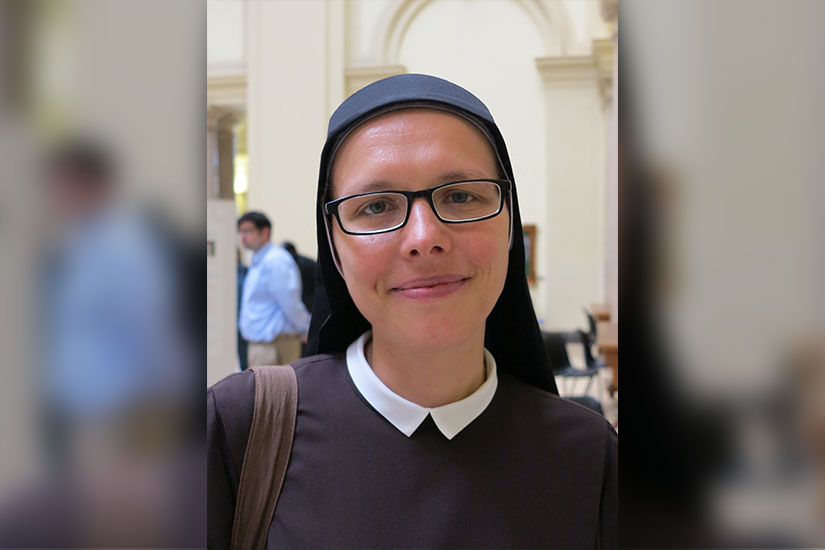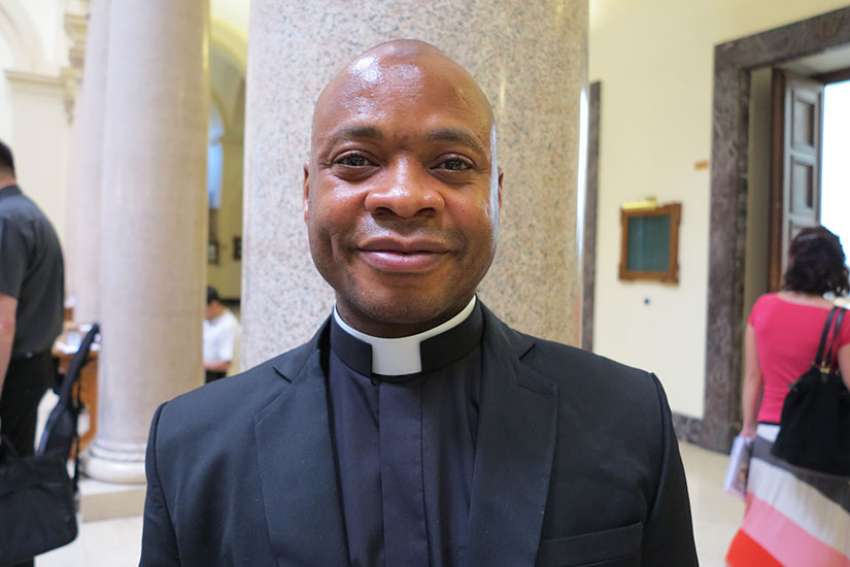The cup might come in handy because their task of promoting child protection will be hard, and "you will be working late, so you will be drinking lots of tea," psychology professor Katharina Fuchs said good-heartedly at the start of the informal graduation ceremony. The graduates – 24 men and women from 18 different countries – would be going back to their dioceses, bishops' conferences or religious orders to kick-start or strengthen child protection policies and measures.
The ceremony, held June 14 at the Gregorian University, included a panel discussion with five post-doctoral students and a poster exhibition of all 24 students' final theses and research. Drew Dillingham of the U.S. Conference of Catholic Bishops' Child and Youth Protection Office was one of those completing the program.
A Capuchin Sister of the Sacred Heart, who works in Slovakia, did her final project on how communism and, before that, centuries-long monarchical rule created a favorable environment for abuse and secrecy because the political systems thrived on and encouraged subordination, passivity and avoidance of responsibility.
Sister Agnieszka Jarkowska said communism also encouraged keeping up appearances and a suppression of public opinion and speech. All of these conditions fed known risk factors for abuse: a concentration of power and authority in one person, fear, mistrust and isolation, she said.
Still today, talking about anything that has to do with sexuality is taboo, families are closed isolated systems, and even the media doesn't talk about abuse. "It's as if it doesn't exist," she told Catholic News Service.
Father Bennette Tang Bacheyie of the Diocese of Wa, Ghana, looked at the common, accepted practice of physical and emotional abuse in his country's school system.
UNICEF reported in 2014 that 80 per cent of children in Ghana experience violent discipline in school, Father Bacheyie said. Even minor transgressions like being late, making noise or forgetting homework are considered to be deserving of corporal punishment. Caning and bullying are common as well as other rituals, he said, pointing to a photograph on his poster presentation showing boys in school uniform kneeling on the hard ground holding a large rock high over their heads.
Father Bacheyie said he will return to Wa to help all 300 Catholic schools in the diocese create a safe school environment by training and educating teachers, caregivers and staff on more effective and humane ways to correct and motivate students, and to teach children "to expose abuse and not stay silent."
He said he plans to create a diocesan youth protection team made up of professionals with different expertise, such as law enforcement, health workers and social workers, so they can build the right kind of policy for schools, which in turn, will need to create their own child protection teams.
 Sister Agnieszka Jarkowska, a Capuchin Sister of the Sacred Heart working in Slovakia, pictured in Rome June 14, completed specialized studies in Rome in safeguarding children from abuse. (CNS photo/Carol Glatz)
Sister Agnieszka Jarkowska, a Capuchin Sister of the Sacred Heart working in Slovakia, pictured in Rome June 14, completed specialized studies in Rome in safeguarding children from abuse. (CNS photo/Carol Glatz)
The hope is that if kids grow up in a safe environment where guidance and discipline can still protect and respect their rights and dignity, "they will have the right tools and know how to treat children" when they are adults, passing that culture down to each successive generation.
Father Dominic Nnoshiri, a member of the Spiritans southeast Nigeria province, looked at the importance of forming open, honest and mature men in seminaries.
Too often, he said, there is a lack of knowledge and meaningful discussion in seminaries about human sexuality; overcrowding; too much isolation from "the reality of their future ministry"; victimization of seminarians who are transparent about their sexuality; and a lack of trust between candidates and formators.
Candidates for the priesthood and religious life need psychosocial, emotional and relational support so they can talk about and prepare for a life of chastity, he said. There also must be healthy and open discussion about respecting boundaries and sexuality, "expressing it positively rather than denying or repressing it."
Professionals should be involved in screening candidates, he said, and women should be involved in formation.
Father Nnoshiri also said some practices in Nigeria's Igbo culture could be integrated in formation, such as wearing simple attire as a reminder of humility and service, taking an oath of fidelity to one's priestly ministry and understanding sacredness in terms of respecting the body of others.
Jesuit Father Hans Zollner, president of Centre for Child Protection, praised the diversity of backgrounds, roles and expertise he saw in the new batch of graduates and expressed great hopes they will make important inroads in their nations where, for the majority of them, sex abuse is not even talked about or acknowledged.
While ensuring child protection is going to be "a long and demanding journey," the centre's first graduates, who finished the course in 2016, already are making a difference, he said.
The graduates create networks and alliances, conduct workshops and give talks on child protection for the church and anyone who requests their help, like NGOs, sports associations and sometimes the government.
"They are considered experts," he said, because "about 75 per cent of all countries have almost nothing in terms of expertise and competence" in the field of abuse prevention and child protection.
With such a need and demand for experts, Father Zollner said the Pontifical Gregorian University plans to offer a new master's degree in safeguarding, promoted by the Centre for Child Protection.
The two-year degree will follow a multidisciplinary approach just like the current certificate program, and it will offer special electives tailored for professionals taking the course, like medical doctors, psychiatrists, psychologists, lawyers and canon lawyers, he said. It will also include completing a semester-long internship.
Building this new army of experts in safeguarding "will have a snowball effect," he said. "Wherever these (students) have been asked to speak publicly, then suddenly people realize you are allowed to talk about it, you can talk about it" and make a difference.


